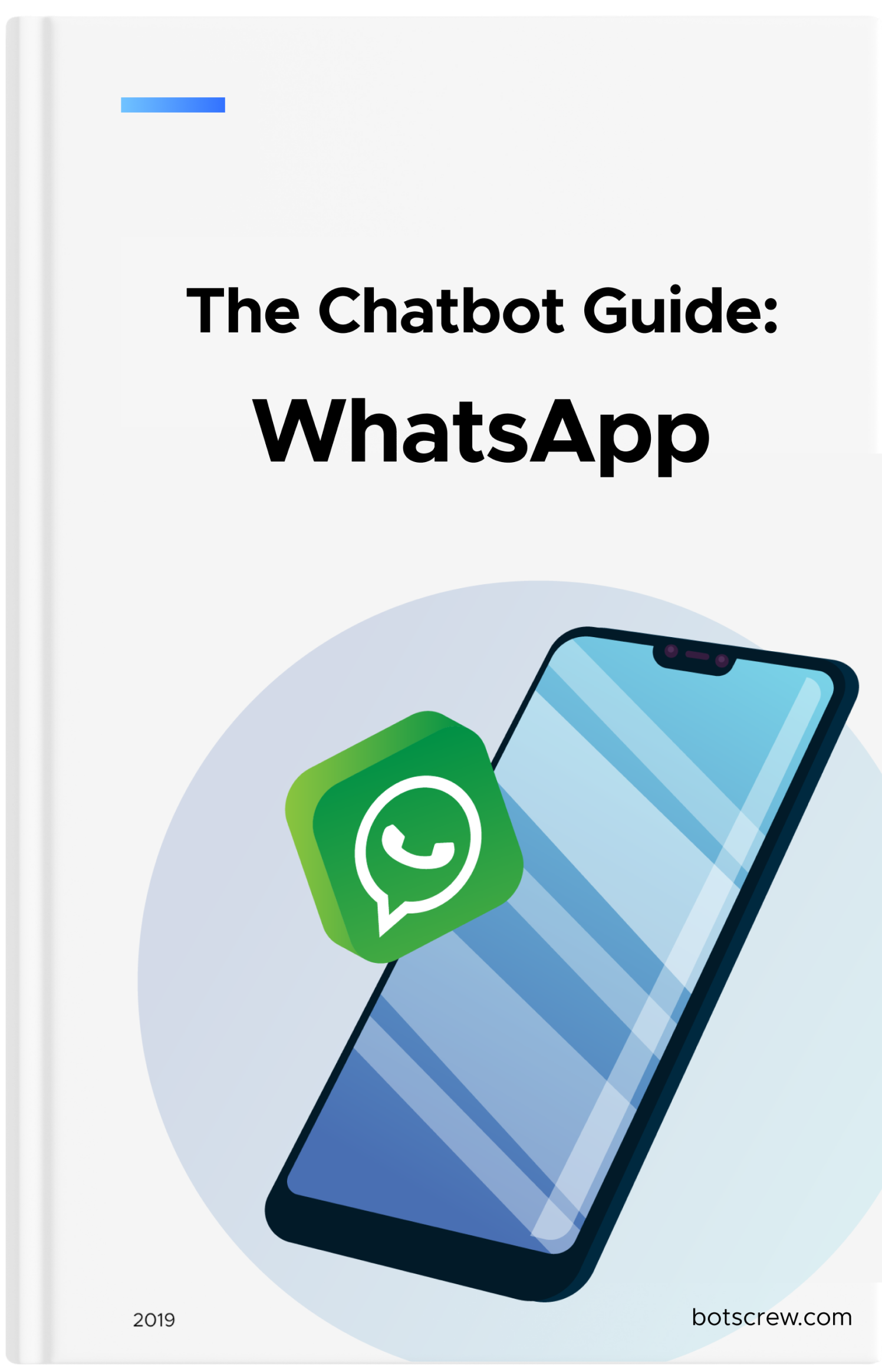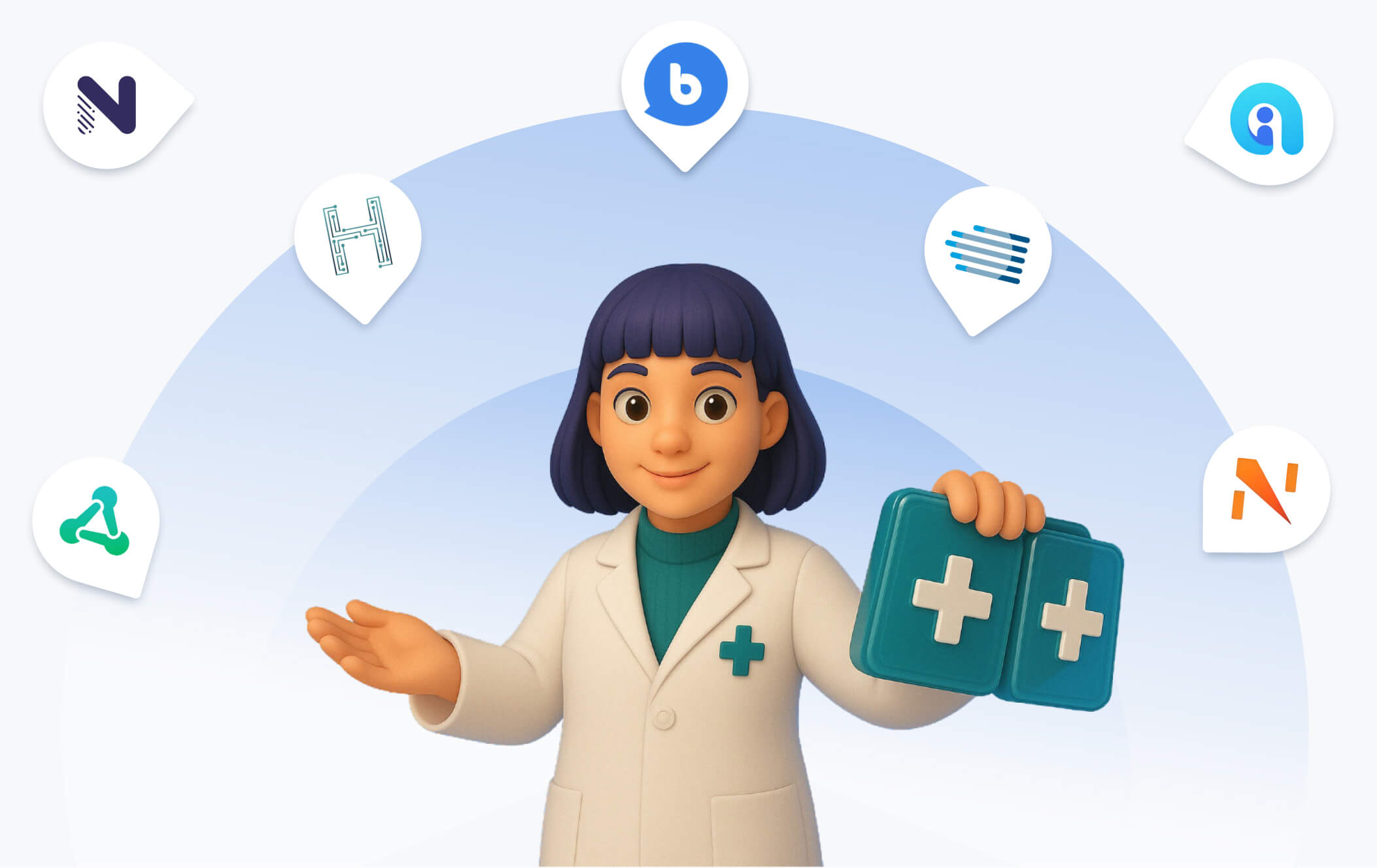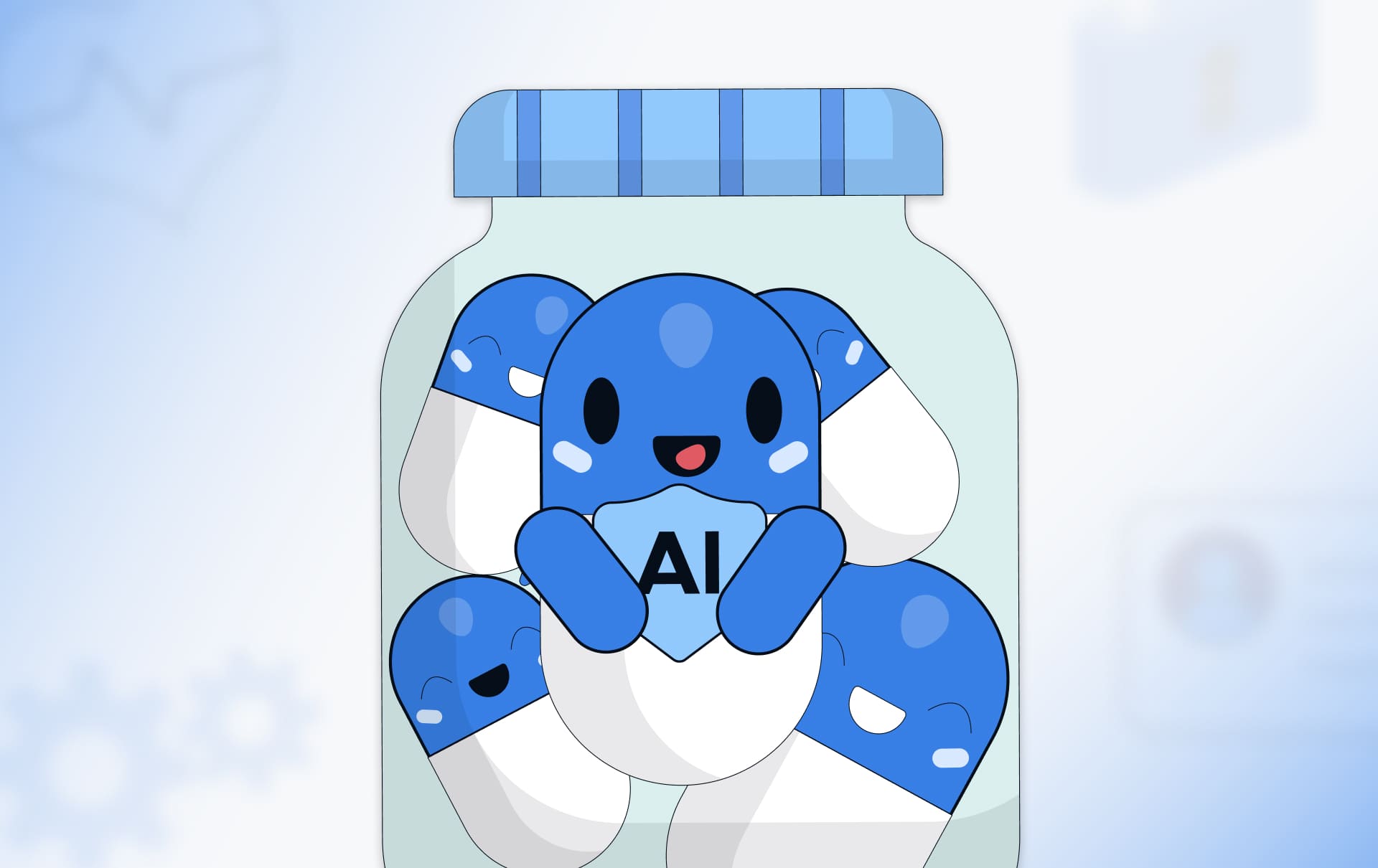AI Agents for Healthcare - Scheduling, EHR, and Administrative Automation
AI agents are revolutionizing healthcare operations by tackling some of the industry’s most pressing challenges - staff shortages, administrative overload, and rising patient expectations. This article explores how generative AI is streamlining scheduling, EHR documentation, and backend tasks to boost efficiency, reduce costs, and improve care delivery.
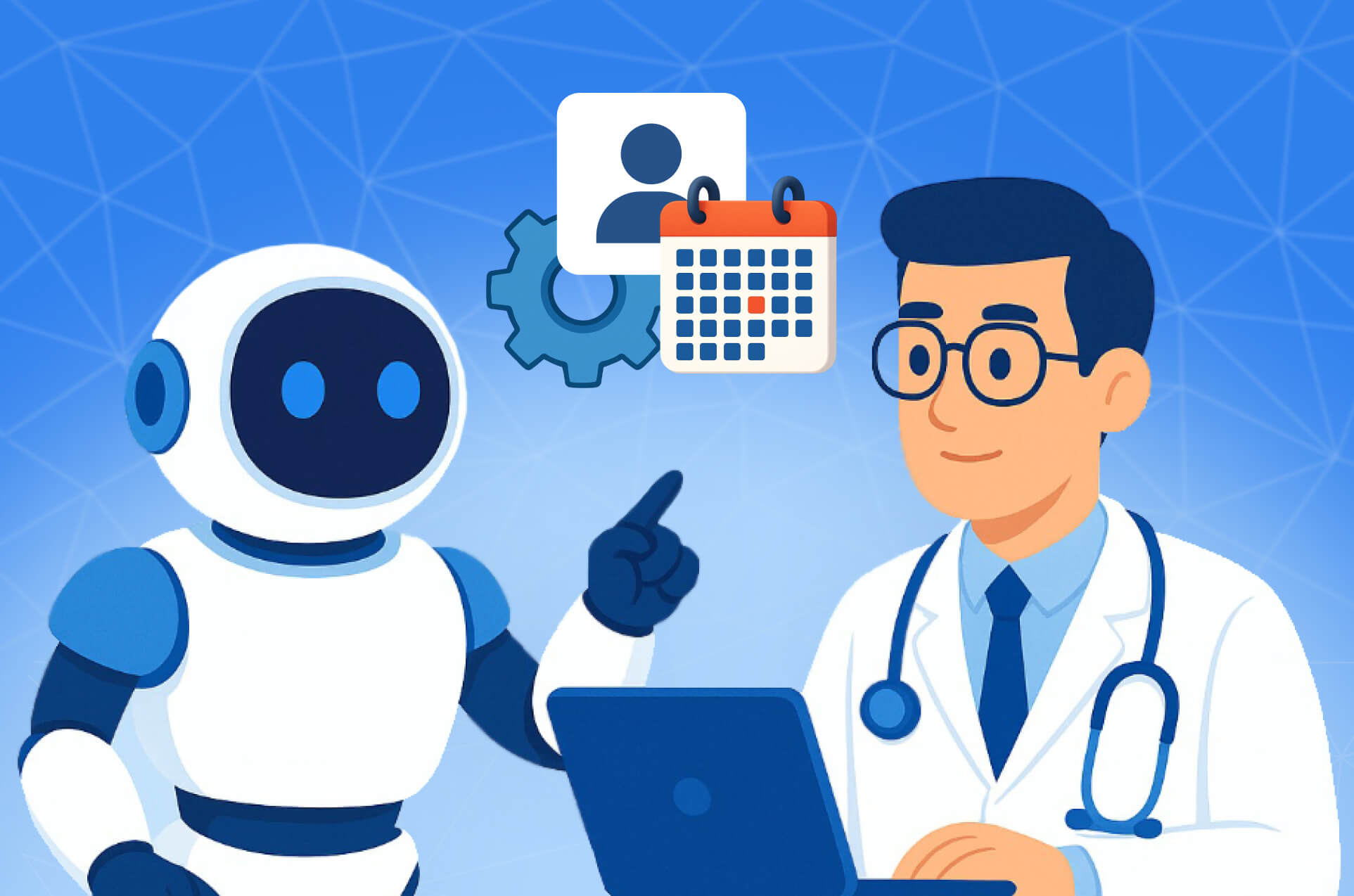
Healthcare systems are under immense pressure to operate more efficiently due to labor shortages, administrative overload, and growing patient expectations. As a result, the adoption of AI in healthcare is accelerating, particularly in operations where automation and intelligent workflows can significantly reduce costs, streamline tasks, and enhance the patient and provider experience.
Healthcare executives state that enhancing employee efficiency is a top priority for 83% of them. They recognize the transformative potential of gen AI, with 77% expecting it to boost productivity, which they believe will not only cut costs but also drive revenue growth.
In today’s healthcare landscape, operational inefficiencies are more than an inconvenience—they’re a threat to patient care, financial sustainability, and staff well-being. According to the American Medical Association, physicians spend nearly 50% of their day on administrative work, while administrative costs account for 25–30% of total healthcare spending. These issues are only magnified by workforce shortages and growing patient demands.
At the forefront of this transformation are AI agents—intelligent assistants capable of performing complex, context-aware tasks across scheduling, documentation, and administrative workflows. Powered by generative AI, these agents are no longer just rule-based bots but adaptive tools reshaping the future of digital health.

What Are AI Agents in Healthcare?
AI agents are autonomous, intelligent software systems that can perceive, understand, and act within healthcare environments. Unlike traditional automation tools, these agents use large language models (LLMs) and natural language processing (NLP) to understand unstructured data, converse with users, and make decisions in real time.
of a healthcare practitioner's time is spent on routine administrative tasks—time that AI can help significantly reduce or eliminate.
From managing healthcare administration to interacting with patients and updating Electronic Health Records(EHRs), AI agents offer scalable, always-on support that improves accuracy, speed, and compliance.
🚀 Ready to automate healthcare operations with AI? Contact BotsCrew to build your own AI assistant for scheduling, claims, or admin workflows.
AI in Healthcare Scheduling and Patient Engagement
One of the most common operational pain points in healthcare is appointment scheduling. Manual booking, reminder calls, and last-minute rescheduling not only burden staff but also lead to high no-show rates.

Manual scheduling is time-consuming, error-prone, and often leads to double bookings, long wait times, and no-show rates of up to 30% in some specialties. Staff spend hours coordinating appointments across phone, email, and outdated systems—time that could be spent improving patient care.
Brainforge reports that AI appointment scheduling can help reduce no-shows by up to 30%, optimize resources, and enhance patient satisfaction.
AI agents for scheduling solve this by:
- Conversing with patients via SMS, chat, or voice to book and reschedule appointments
- Coordinating calendars with doctors’ availability
- Sending personalized, timely reminders based on behavioral insights
- Predicting and mitigating no-shows by offering dynamic rescheduling options
Example:
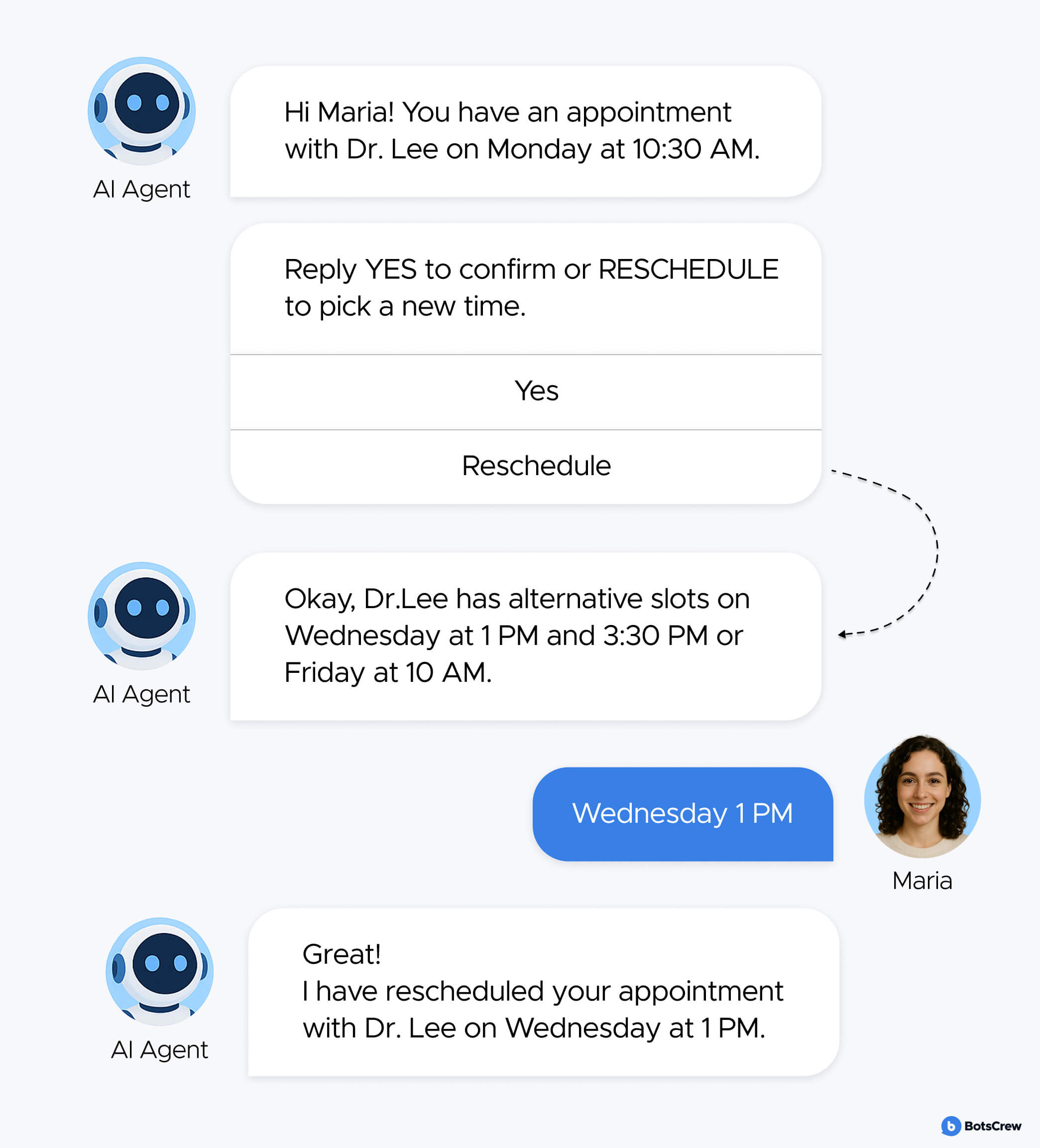
Impact
- 35% reduction in no-show rates
- Up to 60% less time spent by staff on scheduling tasks
- Improved patient satisfaction through self-service options
Generative AI in EHR and Clinical Documentation
The administrative burden of updating EHRs is a well-known cause of physician burnout. Generative AI offers a new paradigm: real-time AI scribes and documentation agents that capture and summarize conversations between clinicians and patients.
For every hour physicians provide direct clinical face time to patients, nearly 2 additional hours is spent on EHR and desk work within the clinic day. Outside office hours, physicians spend another 1 to 2 hours of personal time each night doing additional computer and other clerical work.

Key capabilities include:
- Converting voice-to-text during consultations
- Structuring and entering data into EHRs automatically
- Generating clinical summaries, discharge instructions, and referral notes
Example
During a telehealth visit, an AI agent records and transcribes the dialogue, then automatically drafts a structured summary and updates the EHR with diagnosis codes, treatment plans, and notes—instantly and accurately.
This application of generative AI in healthcare not only improves data accuracy but also allows clinicians to focus more on patient care and less on paperwork.
Impact
- Up to 45% reduction in documentation time
- Improved accuracy in patient records
- Lower clinician burnout
Automating Claims and Administrative Tasks with AI Agents
Healthcare operations are heavily impacted by the complexity of billing, insurance, and backend admin tasks. From claims processing to form handling, delays and errors are common—and costly. Claim denials are a major financial drain: up to 90% are preventable, with documentation errors as a leading cause.

AI agents can:
- Follow up on denied claims by referencing payer rules and documentation
- Answer common billing questions from patients via AI-powered chat
- Help patients understand their bills and insurance benefits
- Automate insurance eligibility checks and pre-authorizations
- Extract data from forms and enter it into backend systems
Healthcare Dive notes that AI-enabled prior authorizations can automate up to 75% of manual tasks, reducing the workload on administrative staff.
Example
A patient visits a provider’s website chatbot and asks, “Is my insurance accepted for this treatment?” The AI agent retrieves the necessary info from payer databases and responds in seconds—without involving support staff.
Impact
- Faster reimbursements
- Lower denial rates
- Reduced manual admin workload by up to 75%
These capabilities help reduce revenue cycle delays, improve reimbursement rates, and free up finance and admin teams. As AI in healthcare claims processing gains momentum, more organizations are seeing faster turnaround and fewer human errors.
AI for Patient Intake and Triage
Initial patient onboarding and triage processes are often slow, repetitive, and resource-intensive. Front-desk staff in urgent care and outpatient clinics are overwhelmed with paperwork, verbal check-ins, and symptom clarification—leading to long wait times and inefficient routing.
AI agents streamline the intake process by interacting with patients before or at the point of care. These agents can:
- Conduct pre-visit check-ins and conversational symptom screening via chatbot or voice
- Guide patients through the digital completion of intake forms, reducing paperwork errors
- Use decision trees and LLMs to triage based on urgency and route patients to the appropriate provider or department
- Flag high-risk symptoms for escalation to human staff or emergency protocols
Impact
By digitizing and automating intake and triage, healthcare providers can:
- Reduce bottlenecks at the front desk
- Shorten patient wait times
- Ensure more accurate and timely care routing
Example
Ada Health’s AI symptom checker is used by health systems like Sutter Health to support initial triage and patient self-assessment, improving operational efficiency and patient satisfaction.
AI for Compliance Monitoring and Audit Preparation
Maintaining compliance with regulations like HIPAA, MACRA, and CMS billing rules is a constant challenge for healthcare organizations. Manual monitoring is labor-intensive, error-prone, and often reactive—leaving providers vulnerable to penalties, data breaches, and failed audits.
AI agents bring automation and intelligence to compliance workflows by:
- Continuously scanning compliance logs and EHR entries to detect irregularities
- Flagging missing patient disclosures, consent forms, or documentation gaps
- Creating audit-ready documentation trails that support internal checks and external inspections
- Generating real-time compliance reports for leadership and regulatory bodies
Impact
By proactively identifying risks and automating audit preparation, AI agents help reduce the likelihood of costly violations. This saves staff hours previously spent on manual checks and provides greater confidence in regulatory readiness.
Explore how AI agents can reduce burnout and streamline operations at scale. Book a free strategy call with our healthcare AI experts
Benefits of Generative AI in Healthcare Operations
Generative AI is transforming healthcare operations by addressing critical challenges and enhancing various aspects of patient care and administrative efficiency.
Enhanced Efficiency and Productivity
By automating routine tasks such as scheduling, documentation, and billing, generative AI allows healthcare professionals to focus more on patient care. This shift not only improves staff satisfaction but also increases the overall productivity of healthcare facilities.
Improved Patient Outcomes
AI-driven tools provide personalized care recommendations and early detection of potential health issues, leading to better patient outcomes. For instance, predictive analytics can identify patients at risk of hospitalization, enabling preemptive interventions.
Cost Reduction
Automating administrative processes reduces operational costs by minimizing errors and decreasing the need for manual labor. This efficiency translates into significant savings for healthcare providers and payers.
Enhanced Data Management
Generative AI facilitates the extraction and organization of unstructured data from various sources, such as clinical notes and patient records. This capability ensures accurate and comprehensive data management, essential for informed decision-making.
Scalability and Accessibility
AI solutions can be scaled to accommodate growing patient populations without a proportional increase in resources. Additionally, AI-powered virtual assistants and chatbots extend healthcare services to remote or underserved areas, improving accessibility.
AI agents don’t just execute—they adapt, learn from context, and drive smarter decisions across workflows.
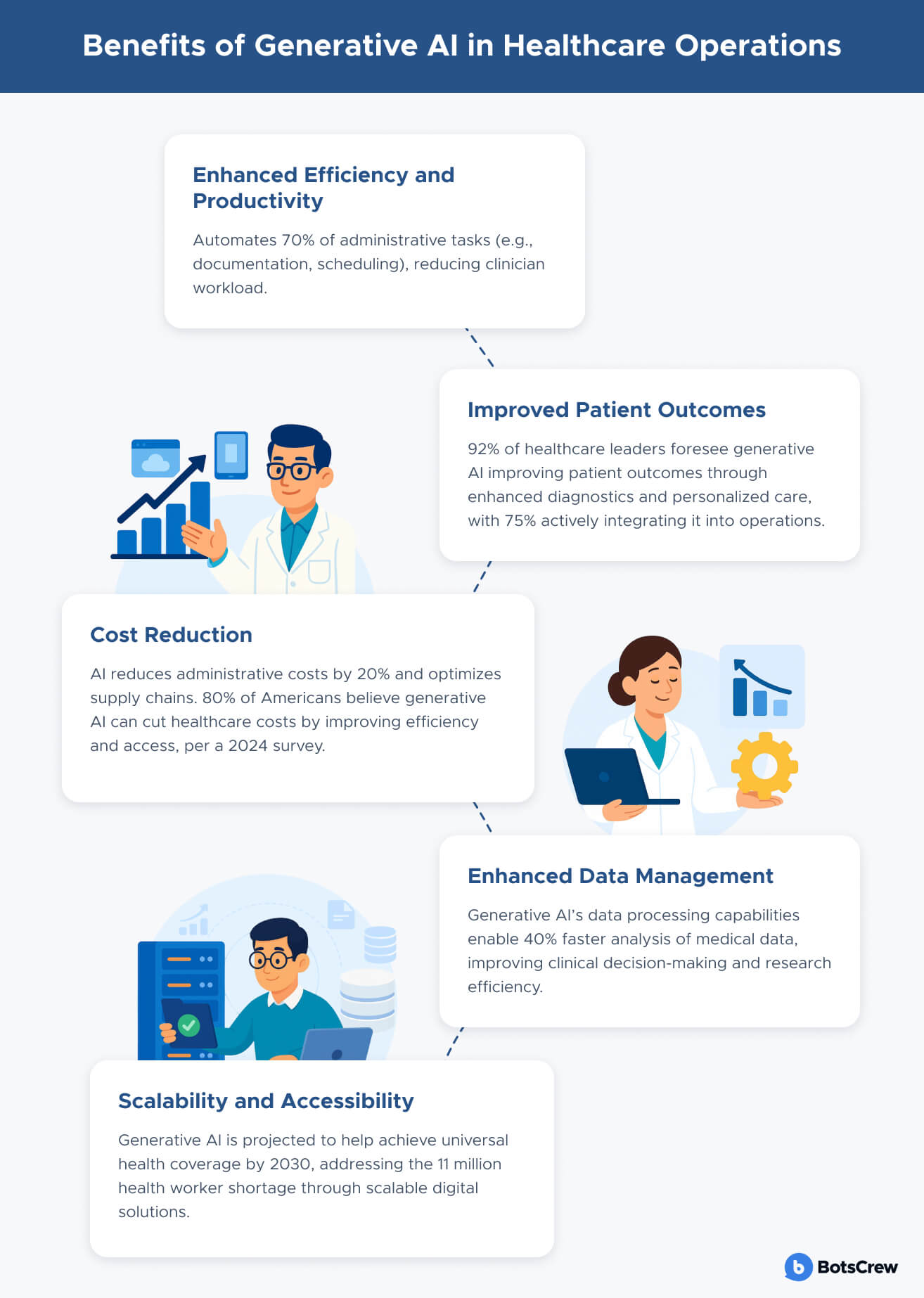
Real-World Examples and Case Studies
Case Study: Genetic Testing Company and BotsCrew AI Chatbot
Our client, a global leader in genetic testing, was receiving 25,000–30,000 customer service calls monthly. With a team of 38 support agents working only weekdays, response delays were common, and 35% of calls went unanswered. To improve response time and reduce staffing pressure, our client partnered with BotsCrew to deploy an AI-powered assistant for website and phone support.
This AI chatbot started as a text chatbot answering top FAQs on the “Contact Us” page, later expanding sitewide and evolving into a voice assistant for inbound calls. It now handles inquiries about test results, payments, order status, appointments, and technical issues.
Impact:
- 125,300 users served
- 25% of all customer service requests automated
- $131,149 in annual cost savings
- 22% of inbound calls handled by voice AI
Wait times and frontline workload significantly reduced, enabling support teams to focus on complex requests.
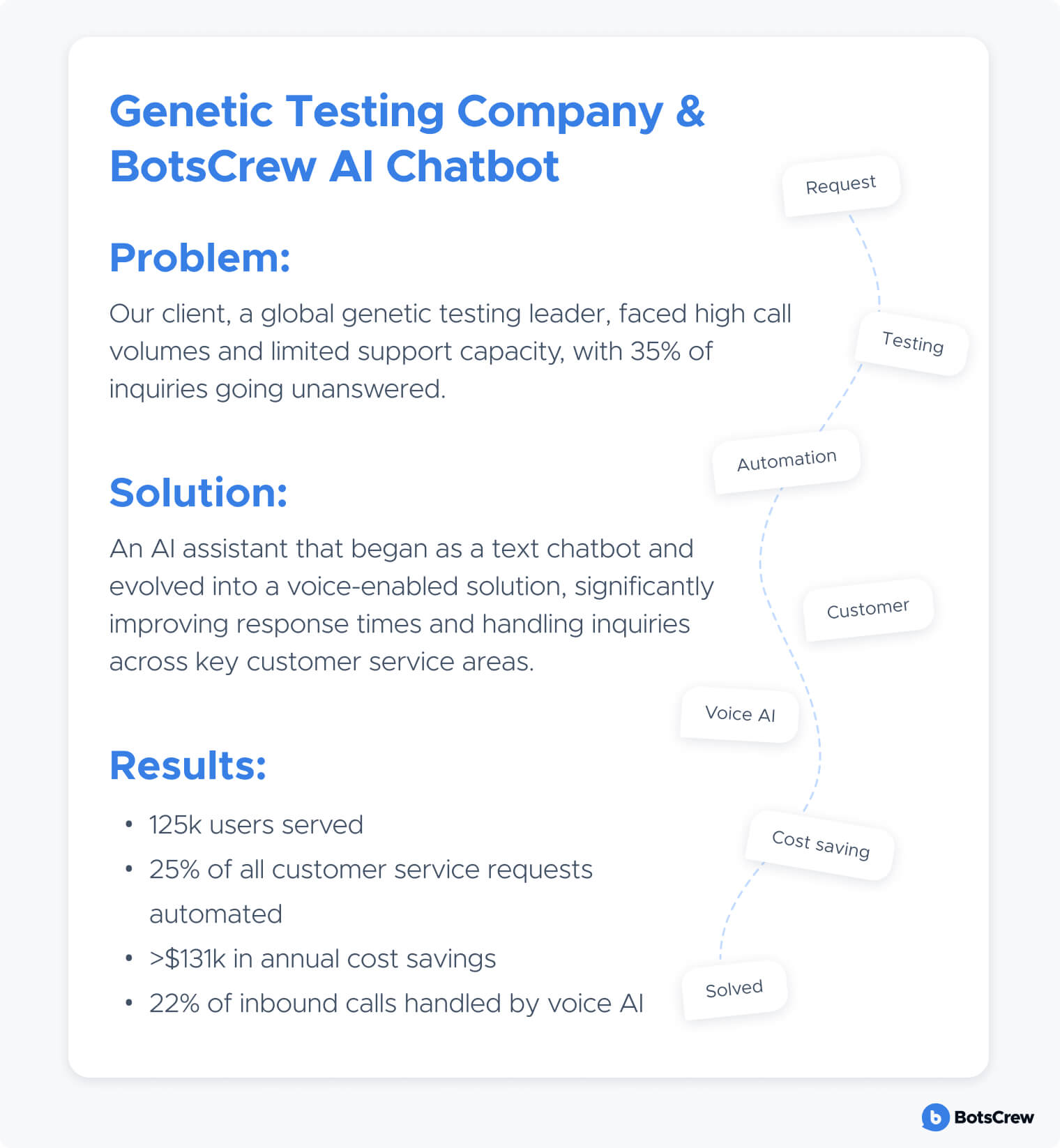
Case Study: TidalHealth Peninsula Regional and IBM Micromedex with Watson
TidalHealth Peninsula Regional in Maryland integrated IBM Micromedex with Watson, an AI-powered clinical decision support tool, into their EHR system. The AI solution streamlined clinical searches by combining patient EMR data with evidence-based insights, reducing the time clinicians spent searching for information. This improved documentation efficiency and allowed more focus on patient care.
Impact
Cut clinical search time from 3–4 minutes to less than 1 minute per query, enhancing documentation speed and accuracy.
Case Study: Parikh Health and Sully.ai
Parikh Health, led by Dr. Neesheet Parikh, integrated Sully.ai into their Electronic Medical Records (EMRs) to enhance operational efficiency and patient engagement. The AI-driven check-in system personalized patient interactions and automated front desk workflows, enabling staff to focus more on care delivery and less on administrative tasks.
Impact
Reduced administrative time per patient from 15 minutes to 1–5 minutes, resulting in a 10x improvement in operational efficiency and a 3x increase in speed. Physician burnout decreased by 90%, enabling more meaningful patient interactions.
Related Content: Top 7 Healthcare AI Development Companies
Key Considerations for AI Adoption in Healthcare
Implementing AI agents isn’t without challenges. To ensure successful adoption:
Ensure compliance: Adhere to HIPAA and local regulations for data privacy and patient safety
Plan for integration: AI agents must plug into EHRs, CRMs, and backend systems
Manage change: Provide training and build trust with staff for smooth transitions
Start small: Identify high-impact, low-risk areas like scheduling or documentation to pilot AI
The adoption of AI in healthcare is not just a tech decision—it’s a strategic one. Success depends on choosing the right use cases, partners, and implementation plans.
Conclusion
AI agents are transforming healthcare operations—from scheduling and EHR documentation to claims and administrative processing. As these technologies mature, their role will shift from support tools to mission-critical infrastructure for digital health.
Healthcare leaders must recognize that embracing AI for healthcare administration is not about replacing staff, but empowering them. Those who act early will gain a competitive edge through better efficiency, reduced burnout, and improved patient care.
Ready to automate your healthcare workflows?
Let’s build your custom AI agent for scheduling, documentation, or patient support.




